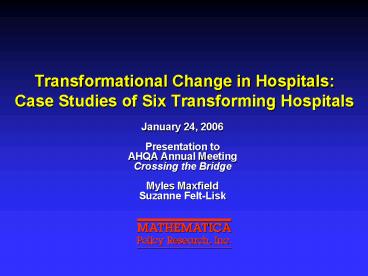Transformational Change in Hospitals: Case Studies of Six Transforming Hospitals - PowerPoint PPT Presentation
1 / 13
Title:
Transformational Change in Hospitals: Case Studies of Six Transforming Hospitals
Description:
Adverse financial or quality events. CEO with a vision and a ... QI theory: Deming, Donebedian, 6 Sigma, Lean-Toyota, PDSA, root cause analysis, microsystems ... – PowerPoint PPT presentation
Number of Views:285
Avg rating:3.0/5.0
Title: Transformational Change in Hospitals: Case Studies of Six Transforming Hospitals
1
Transformational Change in Hospitals Case
Studies of Six Transforming Hospitals
- January 24, 2006
- Presentation to
- AHQA Annual Meeting
- Crossing the Bridge
- Myles Maxfield
- Suzanne Felt-Lisk
2
Objectives
- What is transformational change in hospitals?
- What long-term vision of the health care delivery
system are these hospitals following? - How can CMS support and facilitate
transformational change? - How can QIOs support and facilitate
transformational change?
3
Methods
- Identified 6 advanced hospitals
- McLeod, Florence NC
- Geisinger, Danville PA
- Tallahassee Memorial, Tallahassee FL
- Hackensack Univ. Med. Center, Hackensack NJ
- Exempla Healthcare, Denver CO
- Lincoln Hospital, Davenport WA
- 1-2 day in-person site visits
- Board member, CEO, CFO, COO, CMO, CNO, QI
director, physicians, nurses - How could CMS and QIO have helped at early stages
of your transformation?
4
What Is Transformational Change
- Recognition that quality can be improved
- CEO and board regard quality as job 1
- Transformational change is a process
- All staff are involved
- Systems need improvement, not people
- Working in teams
- Clinical process redesign
5
Vision of the Future
- Continuity of care
- Patient-centered care
- New social contract
- Quality measurement
- Internal
- Public
- Technology
6
Facilitating factors
- Adverse financial or quality events
- CEO with a vision and a passion for quality
- Quality will be rewarded
- Common vocabulary based on theory
- External assistance
- Non-profit status
- Close ties with physicians
7
Transformation Costs and Benefits
- Financial costs
- HIT
- QI staff
- Staff training
- Benefits
- Reduced adverse events and LOS
- Competitive position
- Staff (and physician?) morale and turnover
8
How Can QIOs Support It?
- Identify early adopter hospitals for QIO
intervention - Inspire and motivate
- Communicate with C-suite execs
- Overcome objections
- Business case
- Theory for vocabulary of change
- QI theory Deming, Donebedian, 6 Sigma,
Lean-Toyota, PDSA, root cause analysis,
microsystems - Theory of organizational change John Kotter,
Leading Change - Reliability theory IHI
9
How Can QIOs Support It?
- Clinical process redesign
- Literature synthesis
- Collaborative
- Arrange for experts
- Internal performance measurement
- Not how to report HQA data
- Best practices
- Engaging physicians
- Art, not science
- Sensitive to culture and training
10
How Can QIOs Support It?
- Analytic services
- Trends in local Part A and Part B claims
- Disseminate transformational change case studies
- McLeod seminar
- Premier Rapid Improvement Programs
- IHI-like projects
- 100,000 lives campaign
- Avoid auditing relationships
- Reviewing individual medical records
11
Potential National-Level Implications
- Lead with a vision of transformation
- Payment system
- P4P designed as share in savings
- CPT codes for desired behaviors
- Other financial
- Clinical process redesign
- Direct support of HIT
12
Potential National-Level Implications
- Align regulations and statutes
- Conditions of participation
- State regulations
- Stark law barriers to continuity of care, EHR
- Refine quality metrics
- Real time, fine grained, physician-level
- Outcome measures, efficiency measures
- Respond quickly to changes in clinical best
practice - Data to support continuity of care
- Claims data across settings to facilitate chronic
care management
13
Potential National-Level Implications
- Support physician engagement
- Physician recognition program
- Medical school curricula
- Involve patients in their care
- Health literacy training
- Continue experimenting
- Engage transforming hospitals in designing demos
- Partner with IHI

